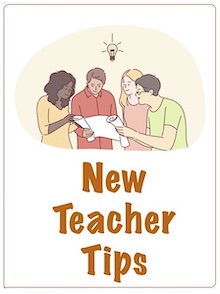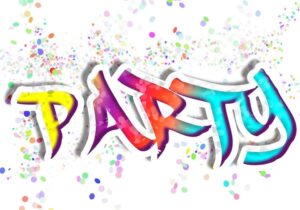Don’t Waste the Precious Weeks at School’s End
A MiddleWeb Blog

As the conversation continued, it became obvious that they planned on leaving well before the last day of the school year. Someone asked aloud what I was already thinking…
“But what about school?”
The parent replied, matter-of-factly, “I’m not worried about it. That’s mostly movie-watching and parties anyway.”
Honestly, I was quite bothered by the comment. It’s not that I believed that there are masses of teachers ‘closing up shop’ after state and district assessments. What DID concern me is that there might be just enough educators slipping into neutral gear to fuel perceptions that final days and weeks of school just don’t matter.
Too many movies?
Years ago, I wrote about the problematic practice of overusing videos in the classroom. I have since observed that teachers spending precious instructional minutes showing funny TikToks, YouTube clips, and movies are often the same individuals who complain that there simply isn’t enough time to address everything required in the curriculum.
Treating students to in-class movies as a reward for ‘good behavior’ or to celebrate the end of the year contributes to the perception already held among some parents and community members that the last weeks and days of school simply don’t matter.
Our goal should be to use video effectively in the classroom and find ways to turn potentially passive media consumption into something more productive.
Beyond parties
Some educators are big on hosting in-class parties during the last days of school. The decision about whether to do so should be made in consultation with school administrators and in sync with school policies.
A word of caution, though…even when end-of-the year parties are well-planned, it’s challenging to ensure that they are inclusive and meaningful.
For example, something as simple as asking students to bring their favorite treat to share with classmates might exclude students who don’t have the resources to do so…or those with particular food allergies.
There are plenty of other fun ways to celebrate, reflect, and foster meaningful closure to the year or semester. For example, students can spend the final days of school assembling (and sharing) end-of-the-year portfolios that highlight their best work, progress, and insights from the course.
Some teachers use tools like Coggle and Bubbl.us to work with their students on year mapping to create end-of-the-year graphic organizers where students (or groups of students) aggregate and share important learning events, knowledge, and skills gained. Other classes ask students to record brief video farewells or predictions using a tool like Flip to give shout-outs of appreciation to others in their class.
Academic alternatives
Instead of viewing the last weeks/days of class as the end of learning, many teachers treat it as the pinnacle of the school year. Final oral exams might require students to prepare for – and respond to – various questions addressing key concepts and skills covered throughout the semester.

With innovative games such as AI Detective, the teacher has students prepare comprehensive answers to various questions that review major concepts covered in a subject or course. Prior to the game, the teacher poses the same questions to ChatGBT.
When the game starts, the teacher displays the question, a few students’ answers (preferably stronger ones), and the answer generated by ChatGBT. Each student then tries to determine, or “detect” which of the answers was generated by AI.
School time is precious time
In the wake of a pandemic that drained away weeks and months of learning time over several years, the value of each learning day has never been clearer. That’s reason enough to make those last days and weeks count.
And here’s another thought: Even teachers who have skillfully and effectively “covered” the curriculum during the year will admit that we could all do a better job tying that learning together for students before they walk out of our classroom doors for the last time.
Resources (including ideas from ChatGPT-4)

My question: “What are some specific examples of fun and educational activities that teachers can incorporate into the last weeks of school?”
Here’s what GPT-4 pulled together from its vast knowledge base:
- Themed days: Organize themed days (e.g., Science Day, History Day, Art Day) where students can participate in various activities, presentations, or workshops related to the subject.
- Field trips: Plan educational field trips to local museums, historical sites, or nature centers that tie into the curriculum and offer hands-on learning experiences.
- Project presentations: Have students present their projects or research to the class, fostering public speaking skills and peer-to-peer learning.
- Guest speakers: Invite professionals or experts in a subject area to give presentations or lead workshops, exposing students to real-world applications of their learning.
- Interactive games: Incorporate educational games that reinforce concepts from the curriculum, such as trivia competitions, scavenger hunts, or escape room challenges.
- Creative arts projects: Encourage students to express their learning through artistic mediums, such as painting, drawing, or sculpture, based on a topic from the curriculum.
- Outdoor activities: Take learning outside by organizing nature walks, scavenger hunts, or hands-on ecology lessons.
- Collaborative challenges: Design group challenges or problem-solving activities that require teamwork, critical thinking, and the application of knowledge from multiple subject areas.
- Cross-curricular projects: Develop projects that incorporate different subjects, allowing students to explore connections between disciplines and apply their knowledge in new contexts.
- Student-led workshops: Encourage students to share their skills or interests by leading workshops or demonstrations for their classmates, promoting peer-to-peer learning and fostering a sense of community.
Incorporating these activities into the last weeks of school can help maintain student engagement, reinforce learning, and create memorable experiences that will leave a lasting impression on your students.
If you prefer to get your tips from a master human teacher, try this article by Edutopia columnist and instructional coaching expert Elena Aguilar:
How to Stay Charged During the Final Weeks of School
…or this amazing collection of Pinterest pins, curated by Jenn Gonzalez at Cult of Pedagogy:
…or Larry Ferlazzo’s collection of his favorite end-of-school articles:
Finishing the School Year Strong
Party image by Alexandra_Koch from Pixabay
Chatbot image by Shutterstock































